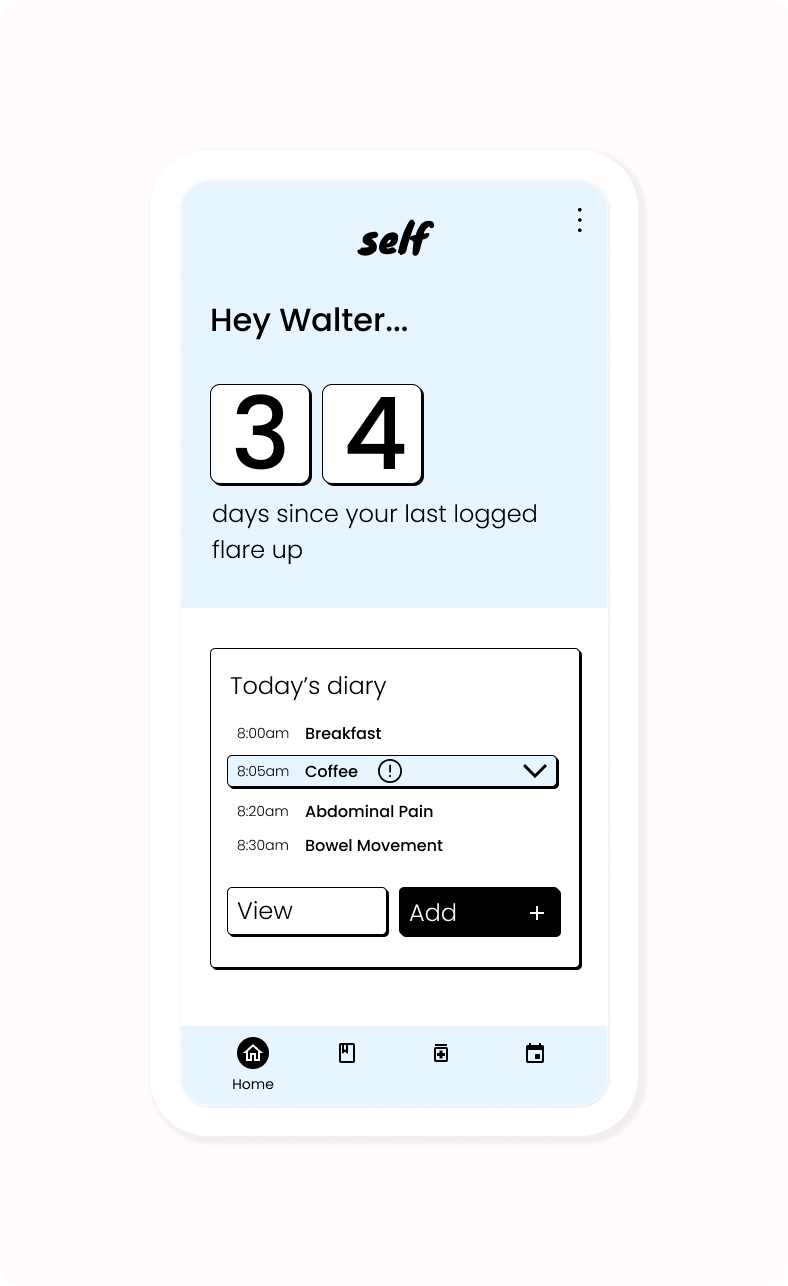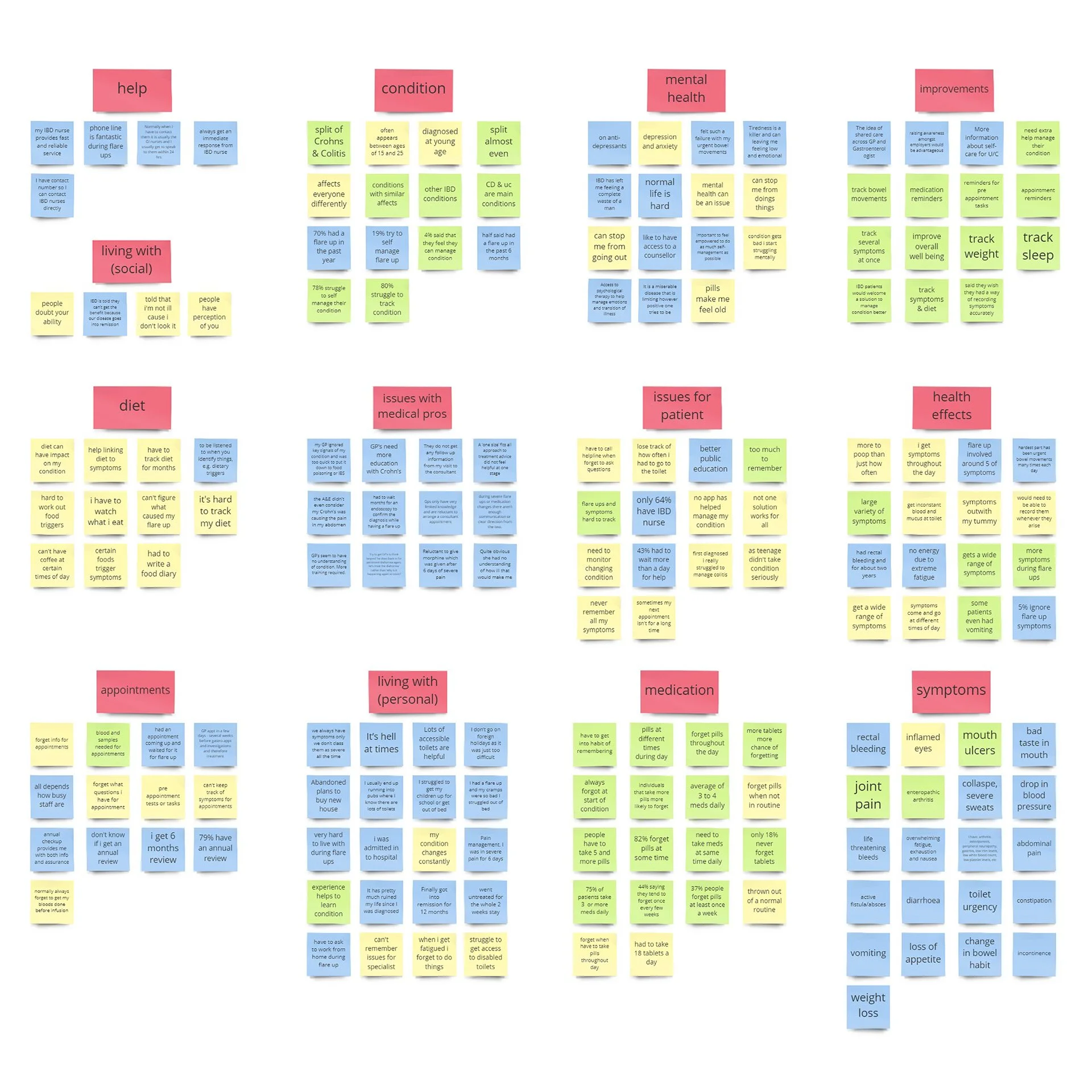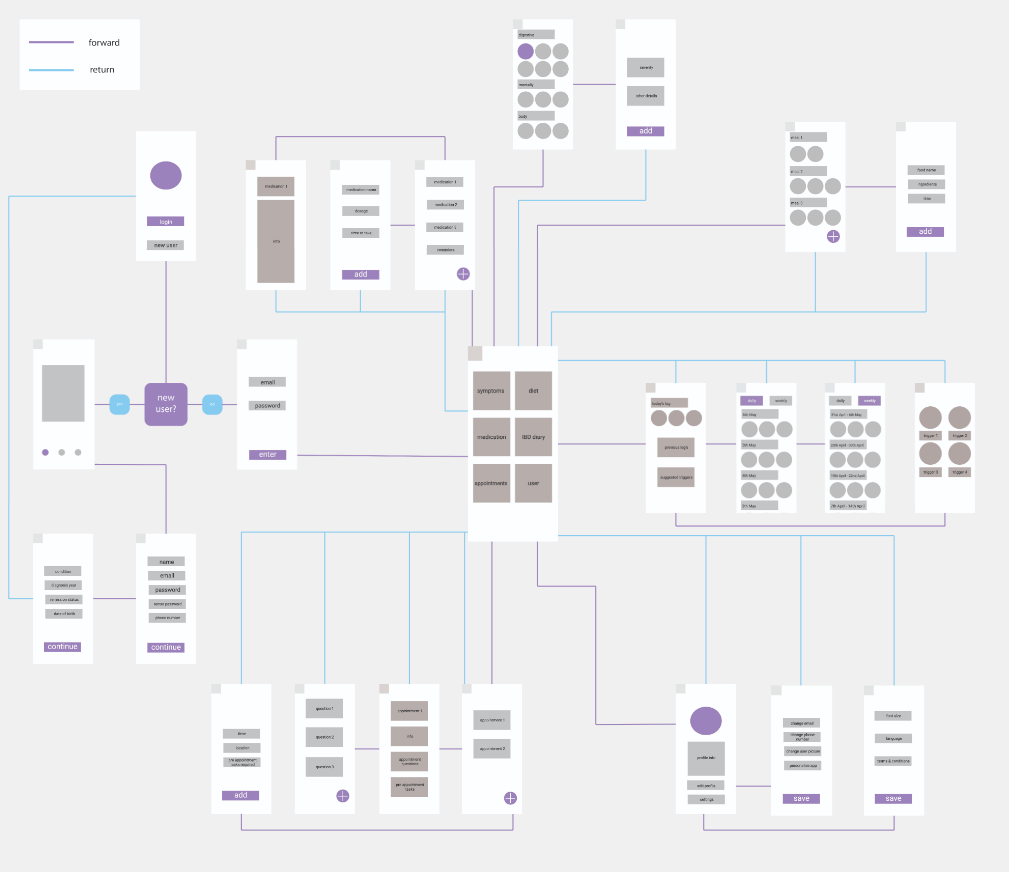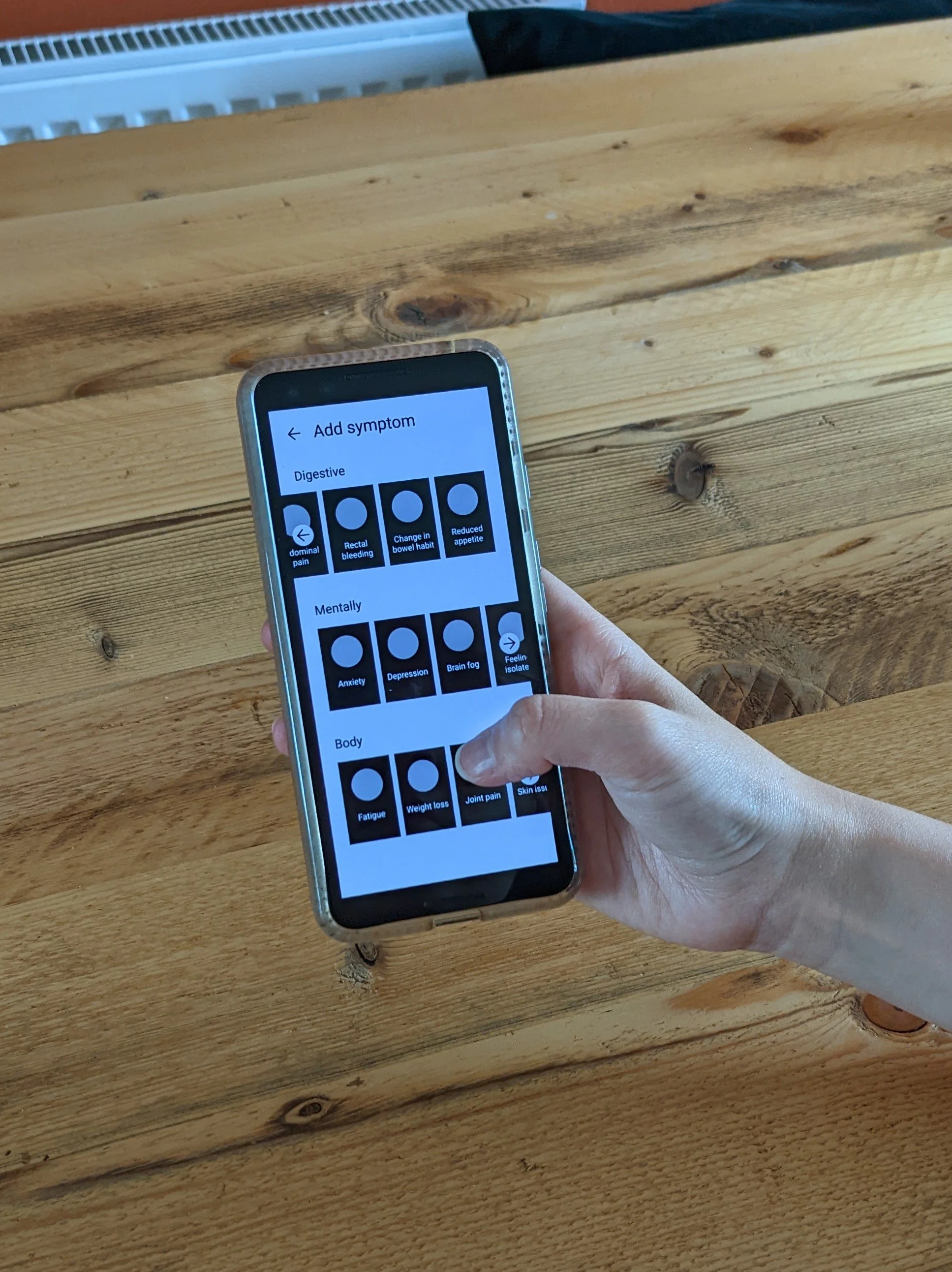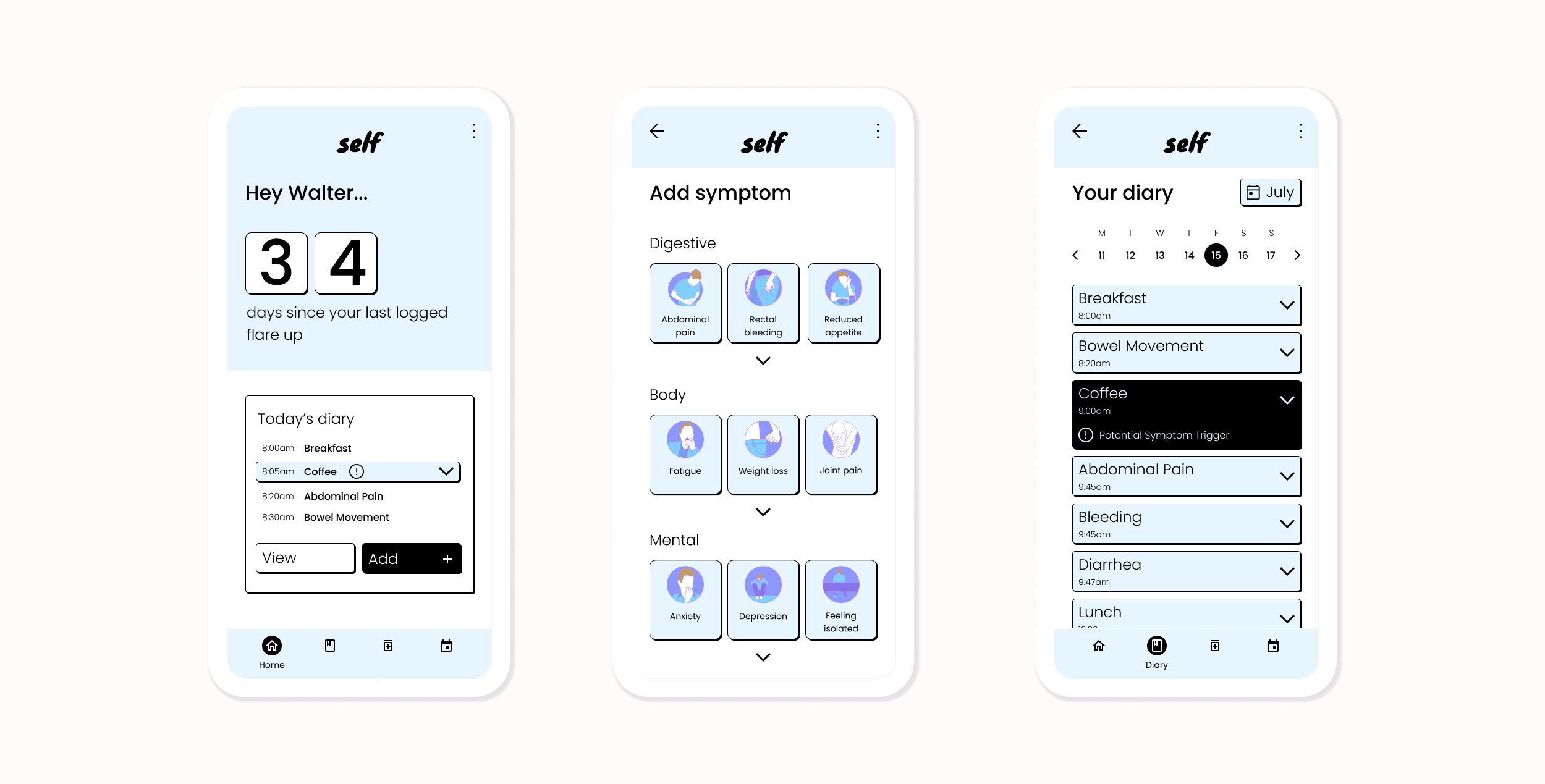Self management for IBD patients
This project aimed to support patients with Inflammatory Bowel Disease (IBD) in better self-managing their condition between scheduled appointments with their medical care team.
Project role: Product Designer & UX Researcher
Project length: 4 months
Project overview
Inflammatory Bowel Disease (IBD) is a group of chronic conditions—including Crohn’s Disease and Ulcerative Colitis—that cause ongoing inflammation in the digestive tract. IBD is highly personal, with symptoms that vary significantly from one individual to another and can fluctuate on a daily basis.
Although there is currently no cure, a range of medications and treatments can help manage the condition. In some cases, surgery to remove part of the intestine may be necessary. Periods of heightened symptoms are known as “flare-ups,” while times of reduced or absent symptoms are referred to as “remission.
Initial findings
To gain an early understanding of the challenges faced by individuals living with Inflammatory Bowel Disease (IBD), a review was conducted using insights from the NHS Scotland and Crohn’s & Colitis UK survey titled “The Experience and Views of the NHS Scotland IBD Service From Some of the People with Crohn’s Disease or Ulcerative Colitis.” This report offered valuable, detailed perspectives on the lived experience of patients, their views on current services, and the everyday difficulties they encounter while managing their condition.
Empowerment Through Self-Management
A key theme that emerged is that many patients wish they had more tools and support to self-manage their condition. They feel empowered when they’re able to take more control of their health, particularly between clinical appointments.
Limited Access to Specialist Support
Access to specialist care remains limited. The majority of patients are reviewed only once a year by a consultant, and just 64% report having access to an IBD nurse, making consistent, expert support difficult to maintain.
Knowledge Gaps in Primary Care
A further challenge is the lack of understanding of IBD conditions among GPs, often leaving patients feeling unsupported or misunderstood at the primary care level.
User research
Patient survey
Building on insights from the initial NHS Scotland and Crohn’s & Colitis UK report, a targeted survey was developed and distributed through IBD-specific community groups and forums on social media. The results revealed several key trends:
Nearly 80% of respondents struggle to self-manage their condition
37% forget to take their medication at least once a week, increasing the risk of flare-ups
The number of factors to monitor makes condition management feel overwhelming and difficult to track
Patients with longer experience managing IBD report greater confidence in managing their symptoms compared to those recently diagnosed
Patient interviews
Individual interviews provided valuable depth to the research, highlighting the diverse and highly personal nature of IBD symptoms. Participants shared that:
Symptom patterns vary significantly between individuals, both in type and severity
Fluctuations can happen at any time of day, making long-term tracking a challenge
Diet and physical activity have a direct influence on symptom flare-ups, with certain dietary triggers worsening the condition
Affinity diagram
To gain a deeper understanding of the raw data collected through various research methods, an Affinity Diagram was created. Individual insights were recorded on sticky notes, then grouped and reorganized to reveal recurring themes and patterns in the research.
Identified User Needs:
Track symptoms and their severity multiple times per day
Link symptoms to potential dietary triggers
Receive reminders to take medication on time
Get notifications for upcoming appointments and related information
User testing of existing apps
To make the competitor app testing as authentic as possible, an IBD patient was asked to download and use each app over a period of time. The user testing covered the following apps: GI Monitor, myIBD, MY IBD Care, and Oshi.
Each app demonstrated valuable features that addressed some needs of IBD patients. However, no single platform provided all the essential tools, meaning that in practice, users would likely need to rely on at least two apps for effective condition management.
Common limitations observed included:
The ability to record symptoms only once per day
A narrow focus on certain symptoms, such as only asking about toilet frequency
A lack of actionable insights to support better self-management
Initial solution
The design focused on helping individuals better self-manage their condition by linking symptoms, bowel movements, and diet within a single experience. To support this, a platform diagram was developed to begin mapping the overall workflow and outline the potential content across each section.
This foundation then informed the early screen designs, where layouts and interface components were mocked up to explore how key features could come together in a cohesive and user-friendly interface.
Usability testing
The early screen designs were linked to create an initial interactive prototype, enabling usability testing to assess whether the flow and overall user experience were intuitive for end users.
During the testing session, participants were asked to use the prototype to log a new symptom—simulating how they would interact with the app in a real-life scenario.
Key findings from user testing included:
Simplify the ‘Add Symptom’ screen to reduce visual clutter and streamline the experience
Minimize reliance on the carousel, ensuring symptoms are easily scannable and quickly accessible
Make potential triggers more visible and clearly presented, helping users draw meaningful connections between their symptoms and possible causes
Project outcome
The Self mobile platform was successfully developed to empower individuals living with Inflammatory Bowel Disease (IBD) to take greater control of their condition through intuitive self-management tools. Rooted in user research, iterative design, and accessibility principles, the solution delivered a personalised experience that addressed the complexities and unpredictability of IBD.
Key outcomes included:
Improved symptom tracking, allowing users to log the frequency and severity of symptoms throughout the day
Integrated diet and bowel movement logs, enabling pattern recognition between triggers and flare-ups
Actionable insights, offering users suggestions on potential symptom triggers and trends unique to their experience
Medication and appointment reminders, helping improve treatment adherence and reduce missed clinical milestones
Accessible, mobile-first design, ensuring the app was usable across all devices and supportive of varying health literacy needs
Feedback from user testing was overwhelmingly positive, with participants expressing increased confidence in understanding their condition, greater ease in managing day-to-day symptoms, and a sense of empowerment through informed self-care.

